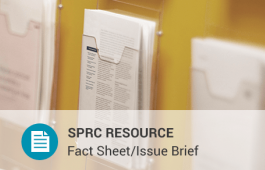This issue brief identifies some of the challenges clinicians may encounter when working at the intersection of intimate partner violence (IPV) and suicide risk and offers screening and safety planning strategies to consider when working with adult clients (i.e., patients) experiencing both suicide risk and a history of IPV.
Screening and Safety Planning With Adults at Risk of Intimate Partner Violence (IPV) and Suicide: An Issue Brief for Clinicians





